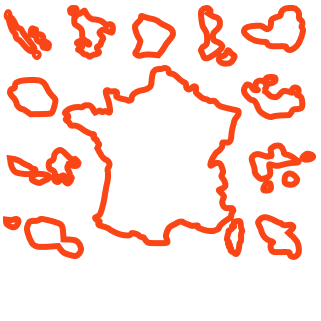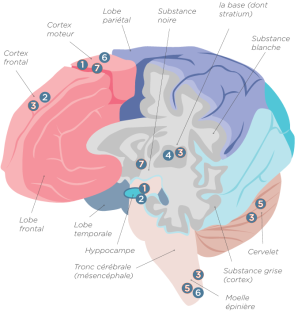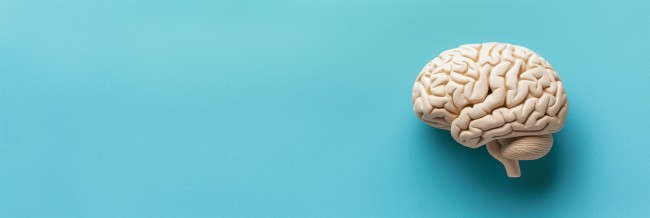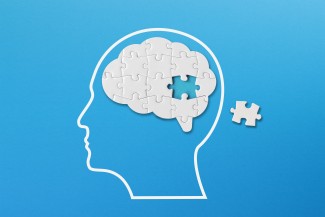Neurodegenerative diseases are disorders of the central nervous system (the brain and the spinal cord) that involve the progressive degeneration of neurons – in other words, their malfunction and death. Because these neurons are hard to regenerate, losing them leads to irreversible disorders that typically worsen over time.
-

1,4 million people affected in France
According to information from Public Health France (Santé Publique France), 1.4 million people in France are currently affected by a neurodegenerative disease. Each year, the number of new cases is increasing each year as the population ages.
While neurodegenerative disease all have neurodegeneration (the death of neurons) as their shared origin, they affect different types of neurons in different parts of the brain and spinal cord and cause a range of different symptoms, ranging from motor impairments to a loss of cognitive function such as memory, language or even psychological integrity.
In fewer than 5% of cases, these diseases are genetic, i.e. they are caused by an inherited mutation. The origin of the 95% non-familial cases is still unknown, but they probably result from a combination of a genetic predisposition and environmental factors.
Except in the case of Alzheimer’s disease and Parkinson’s disease, where there is a clear link to age as a risk factor, there is currently no other environmental factor that is definitively involved in the onset of these conditions.
While around one hundred diseases are considered to be neurodegenerative, the most common ones are Alzheimer’s disease and Parkinson’s disease, Charcot’s disease or Amyotrophic Lateral Sclerosis (ALS), frontotemporal degeneration or dementia (FTD), progressive supra-nuclear palsy (PSP), Huntington’s disease and ataxias.

- Alzheimer’s disease: in France, Alzheimer’s disease affects 900,000 patients, i.e. 1 in every 20 people aged over 65 and more than 1 in 4 people aged over 85.Symptoms include memory problems, impaired reasoning and language, and changes in behaviour.
- Fronto-temporal degeneration (FTD): in France, FTD affects 6,000 patients aged between 50 and 60 years. Symptoms include behavioral disorders, personality changes such as apathy and/or disinhibition, language problems and muscle rigidity.
- Progressive supranuclear palsy (PSP): in France, PSP affects 10,000 patients over the age of 60. It accounts for 3–6% of all atypical Parkinsonian syndromes. Symptoms include a slowing down in mental capacity, apathy, problems with language, attention, vision and swallowing, loss of balance, and eye disorders.
- Huntington’s disease: in France, 18,000 people are at risk of this genetic disease. Symptom onset is between the ages of 35 and 50, and before the age of 20 in fewer than 10% of cases. Symptoms include motor disorders with involuntary and uncontrollable muscle contractions (chorea), breathing problems, speech problems, and difficulty swallowing.
- Hereditary ataxias: in France, 8,000 patients are affected by hereditary ataxias, with an age of onset between 2 and 60 years. Symptoms include low muscle tone and a loss of coordination of movements and balance.
- Charcot’s disease or Amyotrophic Lateral Sclerosis (ALS): in France, 7,000 patients are affected by ALS, with an average age of disease onset of 60. Symptoms include progressive paralysis of atrophying muscles, involuntary and continuing muscle contractions, and problems breathing and swallowing.
- Parkinson’s disease: in France, 150,000 patients are affected by Parkinson’s disease, of whom 80% are over the age of 60. Symptoms include limb tremors, a slowing down in the speed of movements, reduced spontaneous mobility, and muscle stiffness.

Neurological diseases are defined as dysfunction of the central or peripheral nervous system. They may be genetic, mental, traumatic or idiopathic.
Click here






